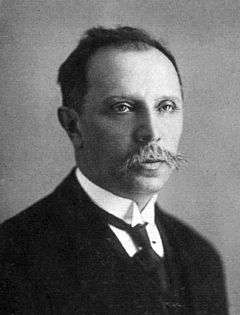Witold Maliszewski
Witold Maliszewski (Russian: Витольд Осипович Малишевский, Ukrainian: Вітольд Йосифович Малішевський; 20 July 1873 – 18 July 1939[1]) was a Polish composer, founder of Odessa Conservatory, and a professor of Warsaw Conservatory.[2][3]

Biography
Maliszewski was born in Mohyliv-Podilskyi, Russian Empire (now Ukraine). He graduated from Saint Petersburg Conservatory, in the class of Nikolai Rimsky-Korsakov.[4] He was a member of Belyayev circle. In 1913 he became a founder and the first director of the Odessa Conservatory, which gave the world a number of outstanding musicians, such as David Oistrakh, Emil Gilels and Yakov Zak.
After the Russian revolution, because of the imminent threat of Bolshevik persecution, Maliszewski immigrated to Poland in 1921. In 1925–1927 he was teaching at the Chopin Music School and was the Director of the Warsaw Music Society. In 1927 he served as Chairman of the First International Frederic Chopin Piano Competition. From 1931 to 1934 Maliszewski was the Director of the Music Department at the Polish Ministry of Education. From 1931 to 1939 he was a Professor at the Warsaw Conservatory. He died in Zalesie near Warsaw.
Maliszewski's style was largely shaped by Russian musical traditions. His symphonies belong to the non-programmatic (Glazunov's) type, and only the Fourth symphony in D Major op. 21 contain elements of Polish dances.[3][5]
In Soviet Union Maliszewski's name was prohibited, and in 1950 the conservatory which he founded in Odessa was given name of Antonina Nezhdanova, who had no links with the institution.[6]
His students include Witold Lutosławski, Mykola Vilinsky, Shimon Shteynberg, Boleslaw Woytowicz, Feliks Roderyk Łabuński, Feliks Rybicki.
Selected works
- Stage
- Syrena (The Mermaid), Opera-Ballet in 4 acts, Op. 24; libretto by Ludomir Michał Rogowski (1927)
- Boruta, Ballet (1929)
- Orchestral
- Symphony No. 1 in G minor, Op. 8 (1902)
- Joyful Overture (Ouverture joyeuse; Fröhliche Ouverture) in D major, Op. 11 (1910)
- Symphony No. 2 in A major, Op. 12 (1912)
- Symphony No. 3 in C minor, Op. 14 (1907?)
- Symphony No. 4 in D major, Op. 21, Odrodzonej i odnalezionej ojczyźnie (To the newborn and recovered homeland) (1925)[5][7]
- Symphony No. 5
- Concertante
- Fantazja kujawska (Kuyavian Fantasy) for piano and orchestra (1928)[8]
- Concerto in B♭ minor for piano and orchestra, Op. 29 (1938)
- Chamber music
- Sonata for violin and piano, Op. 1 (1900)
- String Quartet No. 1 in F major, Op. 2 (1902)
- Quintet in D minor for 2 violins, viola and 2 cellos, Op. 3 (1904)
- String Quartet No. 2 in C major, Op. 6 (1905)
- String Quartet No. 3 in E♭ major, Op. 15 (1914)
- Quatre morceaux for violin & piano, Op. 20 (1923)
- Piano
- Six Piano Pieces, Op. 4 (1904)
- Prélude et fugue fantastiques in B♭ minor, Op. 16 (1913)
- Choral
- Requiem (1930)
- Missa Pontificalis (1930)
Discographie
Archive recordings
- 1952 : Fantazja kujawska (Wladyslaw Kedra, Polish Radio Orchestra of Bydgoszcz, cond. Arnold Rezler)
- 1959 : Piano Concerto (Jakub Kalecki, Jerzy Gert)
- Piano Concerto (Andrzej Stefański, Polish Radio National SO)
Commercial recordings
References
Notes
- "Witold Maliszewski 1873-1939". pwm.com.pl. PWM. Retrieved 20 July 2019.
- Nelson, John (2013). The significance of Rimsky-Korsakov in the development of a Russian national identity. University of Helsinki. pp. 10–11.
- Campbell, Stuart, ed. (2003). Russians on Russian Music, 1880–1917: An Anthology. Cambridge University Press. p. 247. ISBN 978-0-521-59097-6.
- Some sources suggest that Witold Maliszewski also studied with Alexander Glazunov
- Boleslawska-Lewandowska, Beata (2019). Symphony and symphonic thinking in Polish music after 1956. Routledge. pp. 51–52. ISBN 978-1409464709.
- Anniversary of the Odessa Conservatory in the family dimension.
- "Polskie Wydawnictwo Muzyczne SA Page, Symphony No.4". Retrieved June 24, 2012.
- "RMF Classic". Retrieved August 18, 2011.
External links
- Witold Maliszewski
- Free scores by Witold Maliszewski at the International Music Score Library Project (IMSLP)
- Witold Maliszewski (1873–1939) : Joyful Overture (c. 1902) on YouTube
- Witold Maliszewski – piano concerto Op.27 on YouTube
- Maliszewski – Symphony No. 1 (1902) on YouTube
- Witold Maliszewski: Symphony No. 3 in C minor, Op. 14 on YouTube